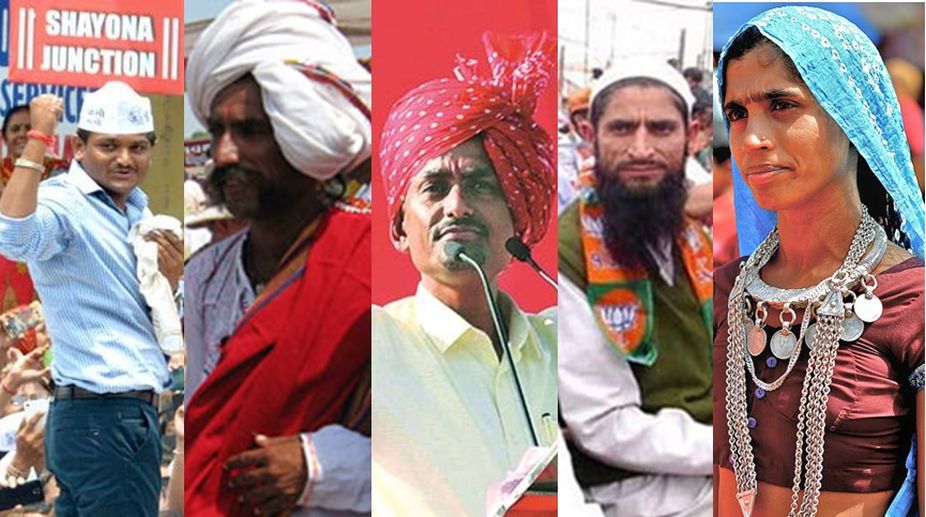In the milieu of forming alliances and gathering support from communities for Gujarat Assembly elections, it seems women have yet received the short-end of the bargain, with the focus mainly on votes division between Patidars, OBCs, Tribals, SC/STs, Thakors, and Rajputs.
Gujarat elections 2017 are scheduled for 9 and 14 December.
Advertisement
The ground reality suggests that Gujarat election has the least representation of ‘women’, who comprise nearly half the electorate. The political relevance, it seems is more on the caste and all political parties seem to give priority to communities and social segments, who have electoral relevance and can ensure winnability for party candidates.
Women, who constitute nearly half the electorate for the coming elections, are given a shorthand by both the parties and given only 12 seats by the BJP and 10 seats by Congress.
Here is arithmetic breakdown:
The political arithmetic being minutely calculated by the Congress and BJP is to tap the politically relevant ‘Patidar’ vote bank and BJP has fielded members of the community on 52 seats, whereas the Congress with a tie-up with Patidar Anamat Andolan Samiti (PAAS) leader Hardik Patel has given tickets to 42 Patidars.
In all, the BJP has given tickets to 182 candidates for all the Assembly seats in Gujarat Election 2017. The Congress, on the other hand, has fielded its candidates on 176 seats leaving five seats for PAAS members and one seat for Jignesh Mevani.
‘Patidars’ are spread all across Gujarat and the areas where they hold a marginally higher sway include, Ahmedabad, North Gujarat, Saurashtra, Charotar and Surat in South Gujarat. The community is considered a mainstay of Gujarat politics with about 50 seats being influenced by the Patidar community vote.
So strong and relevant is the Patidar influence that for the first time both major parties have fielded Patidar candidates against each other on about 30 seats.
Historically the way to Gandhinagar, the seat of power in Gujarat, depends on how the Patidars vote and their influence is clearly seen in the composition of the state cabinet, with 30 per cent of cabinet ministers from the community.
BJP may be against Hardik Patel led PAAS, yet the party has given 32 per cent tickets to Patidars, to achieve its mission of achieving 150 seats. The Congress is also not behind and has given a total of 23 percent seats to Patidars along with OBCs, Tribals, and Dalits.
BJP has always given tickets to new faces and has continued with the trend by declining tickets to 34 sitting MLAs, whereas Congress has declined tickets to only three MLAs and has repeated 40 last time MLAs as the party had earlier committed after the Rajya Sabha elections.
BJP has also given tickets to 7 of the 12 Congress-defectors, who had joined the party at the time of Rajya Sabha elections. The five seats where the party has not offered tickets to Congress rebels include Prahlad Patel of Vijapur, Bhosle Gohil of Jasdan, Chana Choudhary of Vansda, and the other two being Shankarsinh Vaghela’s son and son-in-law.
The Congress and BJP have refrained from giving any representation to the young leaders even though both talk of bringing in new blood and ideas. The parties have also altered set parameters for age and the Congress has named 78- year-old Mohan Singh Rathwa from Jetpur-Pavi, this being the tenth time that he has filed his nomination form. Meanwhile, BJP has nominated 79-year-old Narayan Bhai Patel from Unjha for a record eighth time.
The other important vote bank of the OBCs comprising of about 146 castes and sub-castes including communities of Thakor, Koli, Anjana Chaudhary, Rabari, Ahir, Mare, Dalwadi, Satwara, Panchal, Kadia, Prajapati have been given substantial weightage by both the parties.
With BJP giving 58 seats and Congress 62 seats to members from the OBC community. The community has sway over 74 seats across Gujarat and of these, on 46 seats, the candidates from the same community are pitted against each other.
The overall caste-based arithmetic by BJP comprises of Patidar 52, OBC 58, ST 28, SC 13, Brahmin 10, Jain 04, Kshatriya 12, Muslim 00, and others 05. For the Congress, the seat formula involves Patidar 42, OBC 62, ST 25, SC 14, Brahmin 06, Jain 02, Kshatriya 10, Muslim 06, and others 09.











